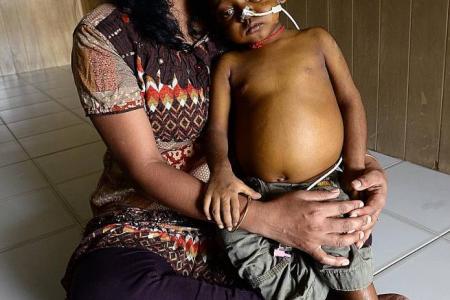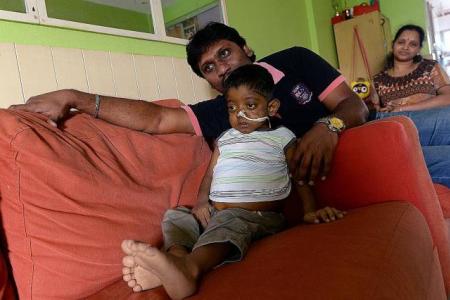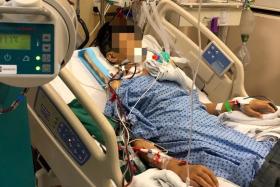Supash, 3, needs liver transplant, or he'll die
At just over three years old, Supash is already living on borrowed time.
Ninety per cent of children with his condition do not survive beyond their third birthday.
Supash has been suffering from biliary atresia, a form of chronic liver disease, since birth.
His condition is serious and he is running out of time, says his doctor.
Supash's parents, Mr V. Senthilkumar, 44, and Madam Supashini, 33, an administrative assistant, have been looking in vain for a suitable donor since he was found to have a failing liver.
With no suitable donors to be found among their relatives, his parents are aware that their only hope of saving Supash is for a stranger to step forward to donate part of his or her liver.
If no suitable donor is found soon, Supash will die, Mr Senthilkumar told The New Paper.
In desperation, the family approached TNP to make a public plea to those with the blood group O positive to come forward.
When TNP visited the family at their three-room flat in Bukit Batok on Wednesday, the first thing we noticed about Supash were his yellowed eyes and bloated stomach.
This is due to jaundice and the build-up of fluids in his abdomen - common symptoms of biliary atresia.
Supash was lying listlessly on the floor. His mother gingerly picked him up, cradled him in her arms and adjusted the feeding tube that runs into his left nostril and down to his stomach.
A feeding tube is used because he does not like to chew food, so doctors had a tube inserted down into his stomach.
SPECIAL DIET
She gently massaged his bloated stomach as she prepared his lunch, a special milk formula. Throughout, he blinked his dark yellow, jaundiced eyes at the flashing television screen and barely moved.
Supash, who also has arthritis, was hospitalised for almost the whole of last month, his father said.
He added that doctors have told him that his son needs a liver transplant very soon or he will die.
The most he might have is a year, said Mr Senthilkumar as he struggled to verbalise his thoughts.
He said he, his wife and their 20 relatives have failed to yield a positive match. Hence his plea to strangers for help.
"I've put my appeal on social media and my friend told me that TNP could help me," he said.
The warehouse assistant said he moved here with his wife from Chennai, India, in 1996.
The couple, who became Singapore citizens about six years ago, have a daughter, Sushmitha, who is eight.
Mr Senthilkumar fondly recalled how on Sept 16, 2011, his wife gave birth to Supash, a moment he described as joyous and proud.
Supash had jaundice, which is not unusual among newborns.
But two weeks later, Supash was diagnosed with liver failure.
"My wife cried on the spot and I volunteered to donate my liver. I thought that since we have the same blood group, it should be no problem," Mr Senthilkumar said.
But tests showed that he was not a suitable donor.
His mother flew here from Chennai in March this year to take the tests.
"But she has diabetes and was deemed unsuitable," he said.
Supash underwent an operation, known as the Kasai procedure, in which a small part of the small intestine is attached to the liver to allow bile to be drained from the liver.
SCREAMS
But the operation, which has only a 30 per cent chance of success and left a scar on Supash's stomach, was not successful.
The only option for Supash now is to get a liver transplant, Mr Senthilkumar said.
The boy has been placed on the National Organ Transplant Unit's wait list for a suitable liver donor.
But waiting has been hard, especially when his son has arthritis and screams out on some nights, he said.
Mr Senthilkumar noted that his son's appetite had dropped recently. Supash also tires easily and does not move about much any more.
"Previously, he loved singing and dancing, especially to the song, What Does The Fox Say.
"Now he barely runs or jumps, even for a minute," he said.
Coping with their son's condition has not been easy, especially for his wife.
"She cries almost every night. When she's on the phone and a relative asks about our son's condition, she breaks down," he said.
Mr Senthilkumar said he was told that a liver transplant operation would cost about $65,000. The couple have a combined monthly income of $3,000 and have cut back on their spending.
He said: "So far, the medical social workers have helped with most of our medical bills, but we are not thinking that far (about the cost of the operation).
"We are just looking for a donor. We have to be positive. I believe we will find a match for our son."
His positivity is evident in the markings of Supash's and Sushmitha's current heights on the front door.
"He will grow taller than his sister one day," Mr Senthilkumar said.
"He will become healthy and able to run around the playground like any other child."
We are just looking for a donor. We have to be positive. I believe we will find a match for our son.
- Mr V. Senthilkumar
WHAT IS BILIARY ATRESIA?
Biliary atresia is a life-threatening condition in infants in which the bile ducts, which carry bile from the liver to the gall bladder, do not function properly.
With biliary atresia, bile becomes trapped, builds up and damages the liver.
Without treatment, the liver eventually fails and the infant needs a liver transplant to survive.
Supash's doctor, Associate Professor Marion Aw, a senior consultant at National University Hospital's division of paediatric gastroenterology, hepatology and nutrition, said his condition is serious.
Most children with this condition have a 90 per cent chance of dying by their second or third birthday, Prof Aw added.
Prof Aw said at the moment, it is difficult to predict how much time Supash has left.
WANT TO BE AN ORGAN DONOR?
Professor K.K. Madhavan, the co-director of the National University Centre for Organ Transplantation, said potential donors must be healthy with no illness and history of medication.
For liver transplants to be feasible, the donor and the recipient should be about the same size (in terms of BMI or body weight) and have the same blood group.
They will have to go for procedures such as blood tests, X-rays and CT scans to determine whether they are suitable donors.
Those found to be suitable will be further assessed by a National Transplant Ethics Committee, which will decide if a transplant can take place.
HOW YOU CAN HELP
If your blood type is O positive, please call Mr Senthilkumar at 9678-4445.
Get The New Paper on your phone with the free TNP app. Download from the Apple App Store or Google Play Store now




